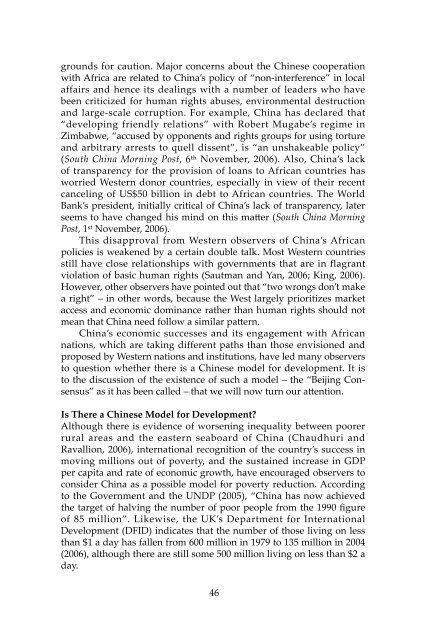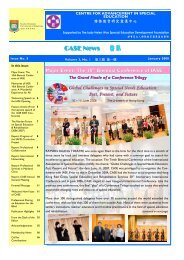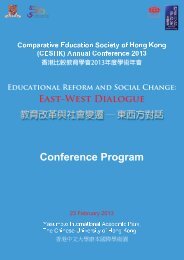Comparative Education Bulletin - Faculty of Education - The ...
Comparative Education Bulletin - Faculty of Education - The ...
Comparative Education Bulletin - Faculty of Education - The ...
You also want an ePaper? Increase the reach of your titles
YUMPU automatically turns print PDFs into web optimized ePapers that Google loves.
grounds for caution. Major concerns about the Chinese cooperation<br />
with Africa are related to China’s policy <strong>of</strong> “non-interference” in local<br />
affairs and hence its dealings with a number <strong>of</strong> leaders who have<br />
been criticized for human rights abuses, environmental destruction<br />
and large-scale corruption. For example, China has declared that<br />
“developing friendly relations” with Robert Mugabe’s regime in<br />
Zimbabwe, “accused by opponents and rights groups for using torture<br />
and arbitrary arrests to quell dissent”, is “an unshakeable policy”<br />
(South China Morning Post, 6th November, 2006). Also, China’s lack<br />
<strong>of</strong> transparency for the provision <strong>of</strong> loans to African countries has<br />
worried Western donor countries, especially in view <strong>of</strong> their recent<br />
canceling <strong>of</strong> US$50 billion in debt to African countries. <strong>The</strong> World<br />
Bank’s president, initially critical <strong>of</strong> China’s lack <strong>of</strong> transparency, later<br />
seems to have changed his mind on this matter (South China Morning<br />
Post, 1st November, 2006).<br />
This disapproval from Western observers <strong>of</strong> China’s African<br />
policies is weakened by a certain double talk. Most Western countries<br />
still have close relationships with governments that are in flagrant<br />
violation <strong>of</strong> basic human rights (Sautman and Yan, 2006; King, 2006).<br />
However, other observers have pointed out that “two wrongs don’t make<br />
a right” – in other words, because the West largely prioritizes market<br />
access and economic dominance rather than human rights should not<br />
mean that China need follow a similar pattern.<br />
China’s economic successes and its engagement with African<br />
nations, which are taking different paths than those envisioned and<br />
proposed by Western nations and institutions, have led many observers<br />
to question whether there is a Chinese model for development. It is<br />
to the discussion <strong>of</strong> the existence <strong>of</strong> such a model – the “Beijing Consensus”<br />
as it has been called – that we will now turn our attention.<br />
Is <strong>The</strong>re a Chinese Model for Development?<br />
Although there is evidence <strong>of</strong> worsening inequality between poorer<br />
rural areas and the eastern seaboard <strong>of</strong> China (Chaudhuri and<br />
Ravallion, 2006), international recognition <strong>of</strong> the country’s success in<br />
moving millions out <strong>of</strong> poverty, and the sustained increase in GDP<br />
per capita and rate <strong>of</strong> economic growth, have encouraged observers to<br />
consider China as a possible model for poverty reduction. According<br />
to the Government and the UNDP (2005), “China has now achieved<br />
the target <strong>of</strong> halving the number <strong>of</strong> poor people from the 1990 figure<br />
<strong>of</strong> 85 million”. Likewise, the UK’s Department for International<br />
Development (DFID) indicates that the number <strong>of</strong> those living on less<br />
than $1 a day has fallen from 600 million in 1979 to 135 million in 2004<br />
(2006), although there are still some 500 million living on less than $2 a<br />
day.<br />
46
















